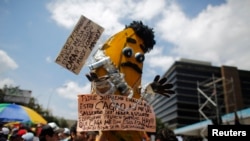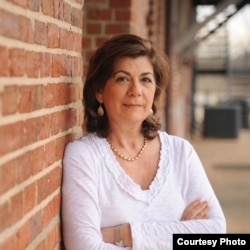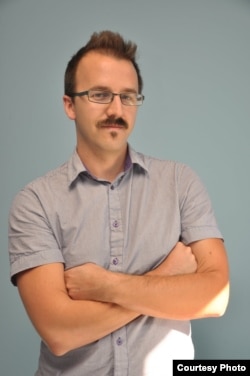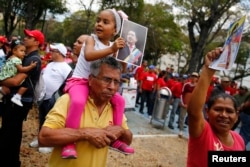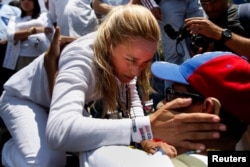WASHINGTON, D.C. —
For weeks, protesters have taken to the streets in Venezuela, opposing Nicholas Maduro, who succeeded the authoritarian Hugo Chavez as president.
Demonstrations that began in the western state of Tachira soon spread to the capital, Caracas. Protesters cite runaway inflation, shortages of food and basic goods and runaway crime, including the world's highest murder rate, as the reasons for going into the streets.
But some observers say the protests—at least those in the capital—are more about returning the social and political elite to power—and that at its roots the conflict in Venezuela is really about race and class.
To understand the issue of racial identity in Venezuela, it’s is necessary to go back into history.
Venezuela was colonized by Spain in the early 16th Century. Tens of thousands of Africans were brought there as slaves until abolition in 1854.
Following World War II, former dictator Marcos Perez Jimenez encouraged the immigration of Europeans, Italians, Portuguese and Germans to help develop the country, a move that writer Winthrop R. Wright, author of Café Con Leche, says was a deliberate move to “whiten” the country.
Venezuelans mixed heritage
Today, most Venezuelans call themselves mestizo, or “mixed,” an amalgam of indigenous, African and European peoples.
“There are no people sitting on the back of the bus, there are no rest rooms assigned for people of this color or that color in Venezuela,” Carolina Acosta-Alzuru, an associate professor of public relations at the University of Georgia and a native Venezuelan, told VOA.
“And also there’s acknowledgement that nobody is of pure European descent, or indigenous descent. That’s why many people think, ‘There’s no racism here.’”
But, she says, they’re wrong, citing Venezuela’s abundant beauty pageants and the telenovelas which embrace the light skin and straight hair – the Western European standards of beauty.
“And if you look at the upper socio-economic levels of the country,” Acosta-Alzuru said, “they tend to be whiter than on the lower socio-economic levels. That is something that is very apparent to everybody.”
Chavez's legacy
Hugo Chávez was the first Venezuelan leader to embrace his Afro-indigenous heritage, telling an interviewer, “Hate against me has a lot to do with racism. Because of my big mouth, because of my curly hair. And I’m so proud to have this mouth and this hair, because it’s African.”
“And this is also where it’s very different from the United States: You had people upset and even saying they were disgusted at having to look at Chavez.
"He was often called ‘the black’ (el Negro) by Venezuelan elites and also understood to be Afro- and indigenous—as opposed to mestizo,” Ciccariello-Maher said.
“Part of what angered elites so much when Chavez came to power was that he was a person who didn’t look like he was ‘fit’ to govern,” said George Ciccariello-Maher, an assistant professor of political science at Drexel University in Philadelphia, is the author of We Created Chávez: A People’s History of the Venezuelan Revolution.
Opponents frequently referred to Chavez as ese mono, or, “that monkey,” and political cartoons played up his dark features—the most overtly racist portrayed him as an ape.
But Acosta-Alzuru says it was Chavez who brought racism to the table.
“But he didn’t put it on the table to raise consciousness. No, no. He wanted to use it to his own advantage,” she said.
The Chavez government took a series of measures to combat racism against people of African descent.
The 1999 constitution criminalized discrimination, and for the first time ever, the 2011 census allowed citizens to classify themselves as Afro-Venezuelans.
Acosta-Alzuru says Chavez’ message to Afro-Venezuelans was: “’The rich people are racist and they hate you,’ when really racism was prevalent throughout the whole culture."
Ciccariello-Maher strongly disagrees.
“That’s premised on the idea that there wasn’t a problem," he said. "There was. It just wasn’t being dealt with. It wasn’t being discussed. It was being concealed.”
“And so bringing it to light—once again, it was not Chavez opportunistically playing the race card; it was a movement demanding that race be taken seriously, and finally, belatedly, Chavez embracing that,” he said.
2014 Protests
The protests began in early February among students in the western states of Tachira and Merida, who complained about gas and food shortages and poor security after the sexual assault of a student.
Protests quickly turned violent after police responded harshly, arresting and allegedly abusing several students, and quickly spread to Caracas, where tensions had been high for weeks since former Miss Venezuela Mónica Spear and her ex-husband were murdered by roadside bandits.
The Caracas protests have centered in Los Palos Grandes, an upscale section of the city.
“Those in the streets are largely middle class students, and this has been clear by the fact of the location of the protests,” Ciccariello-Maher said. “So it’s very difficult to disentangle race and class in these protests.”
He points to the leaders of the opposition movement, Leopoldo Lopez; a former mayor, and Maria Corina Machado, an MP.
“The main opposition leaders are as white and as elite as can be, and the challenge for the Venezuelan opposition is that they cannot succeed without reaching out to the masses, without reaching out to the poor and some of the poorer sectors," he said.
"They confront a visual difficulty, mainly the fact that people are not going to look at these leaders and say, ‘Well, that person represents me,’” he said.
Why aren’t more of the poorer segments of society out in the streets of Caracas?
“Because they identify with this government,” says Ciccariello-Maher, “they identify with the social justice orientation of this government over years which has led, for example, to Venezuelans eating and consuming much more than they did ten years ago.”
But Acosta-Alzuru doesn’t see it that way.
“The kids that are throwing stones are not rich kids," she said "These are kids who come from other socio-economic backgrounds that say they cannot protest in the poor neighborhoods because those are controlled by the pro-government militias. So they come here to do this.”
Ergo, the protesters aren’t all white middle class at all, but include members of the darker, lower classes.
“Everyone wants power,” Acosta-Alzuru said,“and nobody wants power more than the government, than Nicholas Maduro.
"They are holding onto power for dear life," she said. "I think their reaction from the beginning of this was completely out of proportion, and this only made people more and more radical, and this is why I think we have a very difficult situation right now.”
Demonstrations that began in the western state of Tachira soon spread to the capital, Caracas. Protesters cite runaway inflation, shortages of food and basic goods and runaway crime, including the world's highest murder rate, as the reasons for going into the streets.
But some observers say the protests—at least those in the capital—are more about returning the social and political elite to power—and that at its roots the conflict in Venezuela is really about race and class.
To understand the issue of racial identity in Venezuela, it’s is necessary to go back into history.
Venezuela was colonized by Spain in the early 16th Century. Tens of thousands of Africans were brought there as slaves until abolition in 1854.
Following World War II, former dictator Marcos Perez Jimenez encouraged the immigration of Europeans, Italians, Portuguese and Germans to help develop the country, a move that writer Winthrop R. Wright, author of Café Con Leche, says was a deliberate move to “whiten” the country.
Venezuelans mixed heritage
Today, most Venezuelans call themselves mestizo, or “mixed,” an amalgam of indigenous, African and European peoples.
“There are no people sitting on the back of the bus, there are no rest rooms assigned for people of this color or that color in Venezuela,” Carolina Acosta-Alzuru, an associate professor of public relations at the University of Georgia and a native Venezuelan, told VOA.
“And also there’s acknowledgement that nobody is of pure European descent, or indigenous descent. That’s why many people think, ‘There’s no racism here.’”
But, she says, they’re wrong, citing Venezuela’s abundant beauty pageants and the telenovelas which embrace the light skin and straight hair – the Western European standards of beauty.
“And if you look at the upper socio-economic levels of the country,” Acosta-Alzuru said, “they tend to be whiter than on the lower socio-economic levels. That is something that is very apparent to everybody.”
Chavez's legacy
Hugo Chávez was the first Venezuelan leader to embrace his Afro-indigenous heritage, telling an interviewer, “Hate against me has a lot to do with racism. Because of my big mouth, because of my curly hair. And I’m so proud to have this mouth and this hair, because it’s African.”
“And this is also where it’s very different from the United States: You had people upset and even saying they were disgusted at having to look at Chavez.
"He was often called ‘the black’ (el Negro) by Venezuelan elites and also understood to be Afro- and indigenous—as opposed to mestizo,” Ciccariello-Maher said.
“Part of what angered elites so much when Chavez came to power was that he was a person who didn’t look like he was ‘fit’ to govern,” said George Ciccariello-Maher, an assistant professor of political science at Drexel University in Philadelphia, is the author of We Created Chávez: A People’s History of the Venezuelan Revolution.
Opponents frequently referred to Chavez as ese mono, or, “that monkey,” and political cartoons played up his dark features—the most overtly racist portrayed him as an ape.
But Acosta-Alzuru says it was Chavez who brought racism to the table.
“But he didn’t put it on the table to raise consciousness. No, no. He wanted to use it to his own advantage,” she said.
The Chavez government took a series of measures to combat racism against people of African descent.
The 1999 constitution criminalized discrimination, and for the first time ever, the 2011 census allowed citizens to classify themselves as Afro-Venezuelans.
Acosta-Alzuru says Chavez’ message to Afro-Venezuelans was: “’The rich people are racist and they hate you,’ when really racism was prevalent throughout the whole culture."
Ciccariello-Maher strongly disagrees.
“That’s premised on the idea that there wasn’t a problem," he said. "There was. It just wasn’t being dealt with. It wasn’t being discussed. It was being concealed.”
“And so bringing it to light—once again, it was not Chavez opportunistically playing the race card; it was a movement demanding that race be taken seriously, and finally, belatedly, Chavez embracing that,” he said.
2014 Protests
The protests began in early February among students in the western states of Tachira and Merida, who complained about gas and food shortages and poor security after the sexual assault of a student.
Protests quickly turned violent after police responded harshly, arresting and allegedly abusing several students, and quickly spread to Caracas, where tensions had been high for weeks since former Miss Venezuela Mónica Spear and her ex-husband were murdered by roadside bandits.
The Caracas protests have centered in Los Palos Grandes, an upscale section of the city.
“Those in the streets are largely middle class students, and this has been clear by the fact of the location of the protests,” Ciccariello-Maher said. “So it’s very difficult to disentangle race and class in these protests.”
He points to the leaders of the opposition movement, Leopoldo Lopez; a former mayor, and Maria Corina Machado, an MP.
“The main opposition leaders are as white and as elite as can be, and the challenge for the Venezuelan opposition is that they cannot succeed without reaching out to the masses, without reaching out to the poor and some of the poorer sectors," he said.
"They confront a visual difficulty, mainly the fact that people are not going to look at these leaders and say, ‘Well, that person represents me,’” he said.
Why aren’t more of the poorer segments of society out in the streets of Caracas?
“Because they identify with this government,” says Ciccariello-Maher, “they identify with the social justice orientation of this government over years which has led, for example, to Venezuelans eating and consuming much more than they did ten years ago.”
But Acosta-Alzuru doesn’t see it that way.
“The kids that are throwing stones are not rich kids," she said "These are kids who come from other socio-economic backgrounds that say they cannot protest in the poor neighborhoods because those are controlled by the pro-government militias. So they come here to do this.”
Ergo, the protesters aren’t all white middle class at all, but include members of the darker, lower classes.
“Everyone wants power,” Acosta-Alzuru said,“and nobody wants power more than the government, than Nicholas Maduro.
"They are holding onto power for dear life," she said. "I think their reaction from the beginning of this was completely out of proportion, and this only made people more and more radical, and this is why I think we have a very difficult situation right now.”




